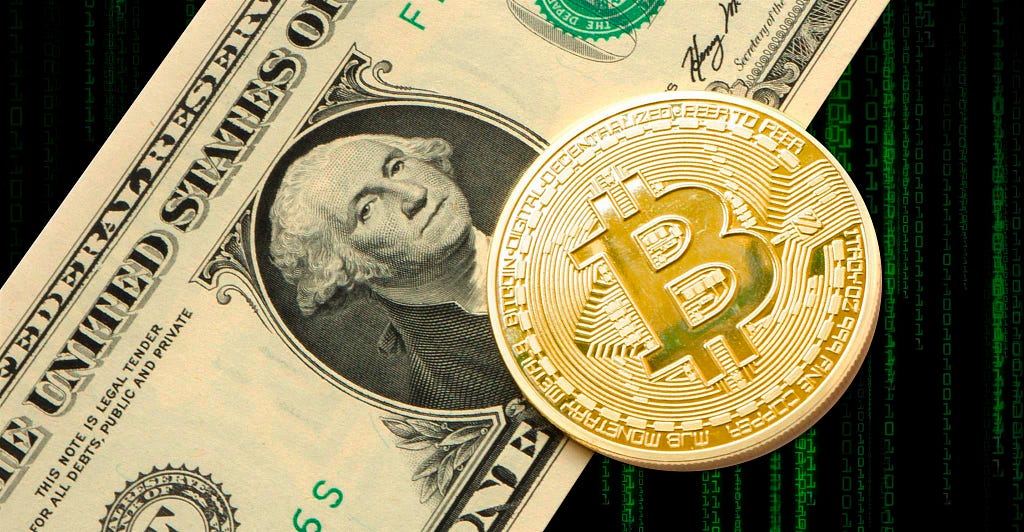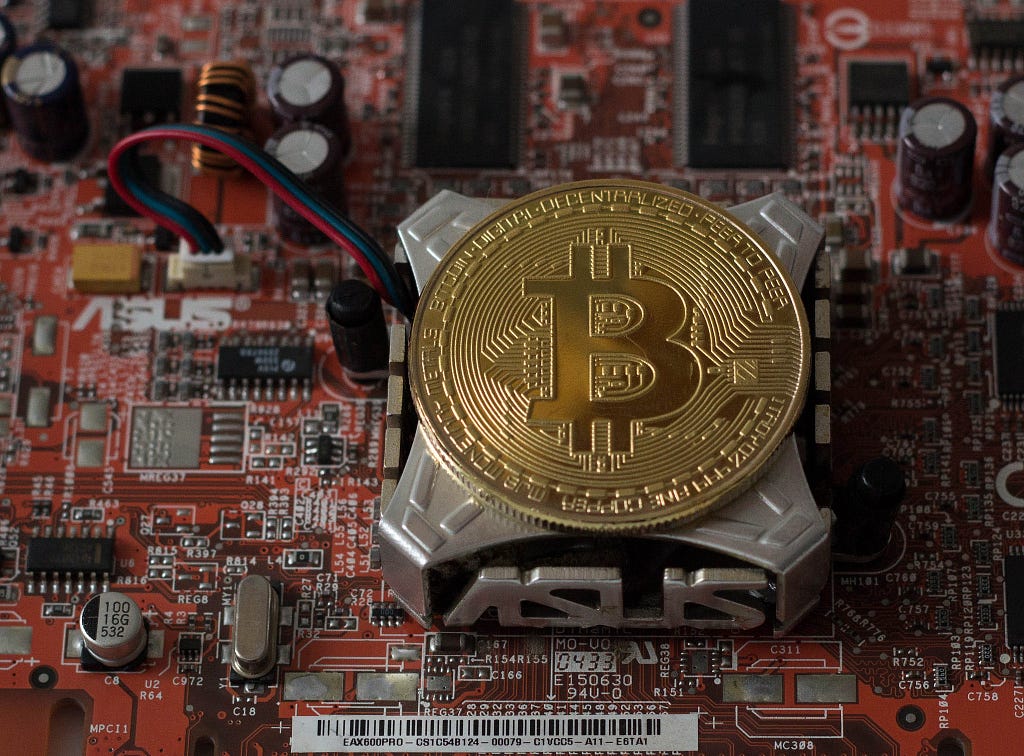Latest news about Bitcoin and all cryptocurrencies. Your daily crypto news habit.
 This picture has the power of dividing audiences into warring tribes.Certain ideas in economics are like contradictory religious beliefs.
This picture has the power of dividing audiences into warring tribes.Certain ideas in economics are like contradictory religious beliefs.
People sink down the rabbit hole of some line of thinking and rarely stop to look around for scenarios in which they may be wrong. And I’m not saying this from a place of zen-like perfection, I’ve been tempted by this too many times in my life, likely still am in some areas.
Which is why it’s a habit of mine to periodically re-evaluate the fundamentals behind ideas and decisions. Well, that and I also prefer when me and other people aren’t colossally wrong. Especially about things like business and economics. Doubly so when they’re claiming to be experts in those fields and take on advising others what to do.
I noticed this often happens with this one idea about the functions of money.
I don’t know which of these expert fellas first applied it to evaluating the viability of cryptocurrencies as money. Nonetheless, I now heard it in dozens of different places and read countless opinion pieces on the subject.
What tipped the scales for me was hearing this from a business analyst in a conversation. To explain my frustration with an analogy: some random guy in a subway being clueless about human anatomy is unlikely to be an issue. If that guy is a practicing surgeon, though? That’s where we enter the danger zone.
I have to step in and make sense of this before people start losing limbs and/or profits.
THE MONEY CONUNDRUM
Here’s the argument:
According to Economics 101, money is commonly defined by its three main functions. It serves as:
- Medium of exchange
- Store of value
- Unit of account
Pretty easy, right? You have giving/getting stuff, having stuff and knowing what stuff costs as the three pillars of money. This can be dollars, pesos or sea shells for all we care, they can all serve these functions.
So at some point in time someone who just took their first econ lecture came up with applying this argument with cryptocurrencies. You compare them to fiat (USD for simplicity) in all three of these areas and it looks something like this:
- As a medium of exchange, cryptocurrencies fall short in ease of transactions, have privacy issues and aren’t accepted in nearly enough places for it to be worthwhile.
- As a store of value, they’re highly volatile and there’s no way in hell to predict what they will cost even a day from now, making economic calculations almost impossible.
- As a unit of account, they’re made obsolete by the above two not working out, so you can’t adequately measure the price of anything.
Decent argument, right? Compared to USD, cryptocurrencies fall flat on all three and are an inferior medium of exchange.
Done and dusted.
Some even go further and conclude that they can’t and shouldn’t be used as money due to the above limitations. Which is the same as saying that because the plane built by the Wright Brothers wasn’t fit for commercial travel, the entire aviation industry is bunk.
 Completely unrelated picture of Orville and Wilbur looking at you. They’re not judging.
Completely unrelated picture of Orville and Wilbur looking at you. They’re not judging.
… let’s not go to the extremely dumb end of the spectrum on this argument and just stick with a «today», shall we? So cryptocurrencies don’t work so well as money today.
Fair enough.
UP IS DOWN, BLACK IS WHITE
Let’s go on a mental journey, to a land where this is flipped.
Let’s say a cryptocurrency is king where we are.
Hell, let’s even say it’s Bitcoin, with all its current flaws.
So you have the transactions that can take hours, the concerns about privacy and the high transaction costs when the network is clogged. Which would be always in our upside down land. It’s far from perfect is what I’m saying.
It kinda sucks. We would have to sign checks to confirm that we did in fact pay for that meal at the restaurant, so the owner has some proof in case transaction is cancelled or fails for some reason.
Everything would be slightly delayed, right?
So we’re not in some market heaven with the perfect currency, our money still kinda sucks. But hey, we’ve all come to use it and bit that bullet. Now it’s not volatile because everyone uses it (actually, it’s a deflationary currency, so it slowly but steadily grows in price), it’s accepted almost everywhere and we measure the cost of most things in Bitcoin.
Then our business analyst friend, let’s call him Sam, comes along:
Oi guys! Our money isn’t perfect. In fact, it kinda sucks. I came up with a far better alternative.I called it the USD. Don’t ask why, I just did.Check this out: it’s instant and sometimes anonymous transactions! I have a bunch of these pieces of paper that I can give to someone, and they basically represent stuff we’re gonna do later — our future productivity, yo! It’s totally debt-based.I’m just gonna be issuing as many of these as I think we can pay back in the future. Heck we can even write them into computers as strings of numbers so we don’t have to pass paper around, don’t matter.So I’ll just write as much of these as I think we need for it to work and stuff.I’ll be totally fair about this and only get into as much debt as the economy can pay off, for real! I’m super smart and know exactly when and how to pull that leaver. So all of you dudes and dudettes can enjoy almost instant, cheap transactions.When you pay with these numbers in computers instead of paper, I’ll know and will be able to stop or cut you off — but I’ll only do this sorta thing with criminals, so you got nothing to worry about, no privacy concerns like with that Bitcoin we all use. It’ll be great!Why are you looking at me like that? Sam is… quite the idea man.
Sam is… quite the idea man.
Oh, I’m thinking about the three functions of money, this is my thinking look.
Just had my first lecture in an econ class, actually.
BRINGING IT ALL BACK AROUND
You see, Sam, this can’t possibly work today.
Maybe in some future world where your USD isn’t just ideas and promises you came up with, but there’s no way we can do any of this and use it as money.
Compare this USD of yours to Bitcoin:
- As a medium of exchange, we’ve got no idea how much these promises of yours cost, you’ll have full control over how many you make, and this thing won’t be accepted anywhere unless you convince or force people to do so.
- As a store of value, they’ll depend on your authority, so there’s no way to predict if you’ll have any even a day from now, making economic calculations almost impossible.
- As a unit of account, they’re made obsolete by the above two not working out, so you can’t adequately measure the price of anything.
Not to mention stuff is always going to get more expensive as this USD thing inflates over time. I guess the thing you have on us is transaction speed.
We’re working on that.
MAKING SENSE OF VALUE
Great trip! Back into the normal world — let’s bookend this thing.
The perspective flip we did just now isn’t an argument for cryptocurrencies and against fiat, but a rejection of the deterministic thinking people sink into. You can easily rally around any dominant medium of exchange in any historical period with such statements.
Yes, even seashells.
Thing is, three functions of money aren’t intended to simply slap judgements on. There’s actually a gazillion factors we use to determine if something works for us as money or not, and they’re prioritized on an individual basis, applied to any given situation.
We have to understand where value comes from in the first place to make sense of anything.
Value is generated by people making decisions.
We didn’t have the choice of cryptocurrencies before — now we do. So, this is exactly what’s happening: countless individuals are determining the viability of cryptocurrencies as money, in real time, as you’re reading this.
We’re experimenting and slowly building up different forms of consensus.
Notice, for example, how prices on lots of coins are often calculated and displayed in BTC. In these cases, we decided that it works better than USD for measuring their value.
 We also started measuring the price of graphics units in monthly salaries.
We also started measuring the price of graphics units in monthly salaries.
There are people out there who will find cryptocurrencies a superior money to fiat no matter what, they tick all the requirements for them. Just like there those who can do the same with seashells, for that matter — and if they work better in their circumstances, then they’re objectively using better money.
Like doctors are supposed to understand anatomy, businessfolk are supposed to understand economics. Bad analysis kills opportunities as efficiently as medical malpractice kills people.
It’s important to not only think about the seen, but also the unseen — what is and what could be. Human decisions involve lots of factors.
We’re not Borg with the same priorities for everyone.
Lack of widespread adoption might be turning some people off and attracting others for the same reasons. This is what differentiates economics from social engineering.
Experiment. Exchange value with other people and make the world a better place. Don’t let others decide what the superior form of money is.
Make your own mind up.
And hey, I may not be a business analyst, but do operate a bit like a surgeon. I also have 4–5+ week waiting lists, making the analogy fit even better. If you want to receive daily tips & insights, go to https://alexpartin.com
Our money isn’t perfect. In fact, it kinda sucks was originally published in Hacker Noon on Medium, where people are continuing the conversation by highlighting and responding to this story.
Disclaimer
The views and opinions expressed in this article are solely those of the authors and do not reflect the views of Bitcoin Insider. Every investment and trading move involves risk - this is especially true for cryptocurrencies given their volatility. We strongly advise our readers to conduct their own research when making a decision.
